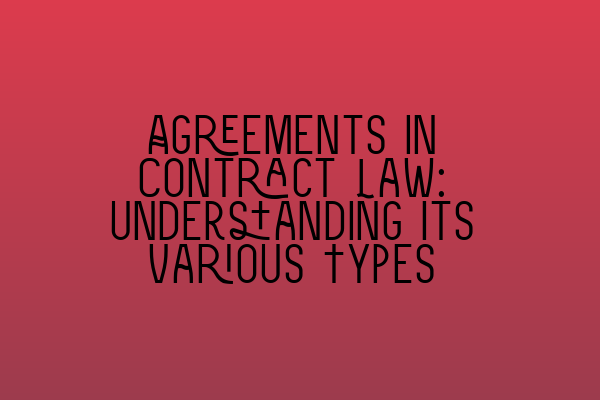Agreements in Contract Law: Understanding Its Various Types
When it comes to contract law, agreements play a crucial role in defining the rights and obligations of parties involved. An agreement is a legally binding contract between two or more parties, which establishes the terms and conditions that they should adhere to. In this article, we will delve deeper into the various types of agreements in contract law and explore their significance.
Express Agreements
The most common type of agreement in contract law is the express agreement. This type of agreement is explicitly stated and can be either oral or written. In an oral agreement, the terms and conditions are discussed and agreed upon verbally, while in a written agreement, the terms are documented and signed by the parties involved. Express agreements provide clarity and act as a foundation for a legally enforceable contract.
Have you ever wondered how to interpret contractual clauses to uncover their hidden meanings? Check out our related article on Interpreting Contractual Clauses: Unlocking the Hidden Meanings to gain a deeper understanding of this concept.
Implied Agreements
An implied agreement, also known as an implied-in-fact agreement, is formed through the conduct or actions of the parties involved. Unlike express agreements, implied agreements are not explicitly stated but are inferred from the circumstances surrounding the parties’ behavior. These agreements come into existence when there is an expectation that both parties have consented to the terms and conditions. Implied agreements can be as legally binding as express agreements.
Unilateral Agreements
In a unilateral agreement, one party makes a promise or offers a reward in exchange for a specific action or performance from the other party. The agreement becomes legally binding only when the second party undertakes the required action or performance. For example, offering a cash reward for finding a lost item is a unilateral agreement. The party who finds the item and fulfills the specified conditions can claim the reward.
Are you a student struggling to grasp complex contract law concepts? Our related article on Contract Law Tutorials: Simplifying Complex Concepts for Students can help simplify the subject and provide clarity.
Bilateral Agreements
Bilateral agreements, also known as mutual agreements, are the most common type of agreement in contract law. In a bilateral agreement, both parties make promises to each other and are obligated to perform their respective obligations. These agreements involve mutual consent and consideration, creating a legally binding contract. A typical example of a bilateral agreement is a contract for the sale of goods or services.
Executed and Executory Agreements
An executed agreement is one in which all parties have fulfilled their obligations, and the contract is fully performed. Once an executed agreement is in place, the rights and obligations of the parties no longer exist. On the other hand, an executory agreement is a contract in which one or both parties have yet to fulfill their respective obligations. Until all obligations are performed, the contract remains executory.
Curious about the discharge of contracts and its modes and consequences? Our related article on Discharge of Contracts: Modes and Consequences Explained can provide you with a comprehensive understanding of this topic.
Third Party Agreements
In contract law, parties are generally free to enter into agreements with one another. However, there are instances where a contract may confer rights or impose obligations on a third party who is not a party to the original agreement. These third-party agreements are usually created through the inclusion of a specific provision in the contract, allowing a third party to enforce its terms or benefit from the agreement. The boundary and implications of third-party rights in contract law can be complex and require careful consideration.
For a more in-depth exploration of third-party rights, you can refer to our related article on Exploring Third Party Rights in Contract Law: Implications and Boundaries.
Conclusion
Understanding the different types of agreements in contract law is essential for any party entering into a contractual relationship. Whether it is an express agreement, implied agreement, unilateral agreement, bilateral agreement, executed agreement, executory agreement, or third-party agreement, each type serves its purpose and carries legal significance. By having a thorough understanding of these agreements, parties can navigate their contractual obligations with confidence and avoid potential disputes.
If you want to gain further insights into contractual obligations and how to navigate the responsibilities of parties, check out our related article on Contractual Obligations: Navigating the Responsibilities of Parties.
